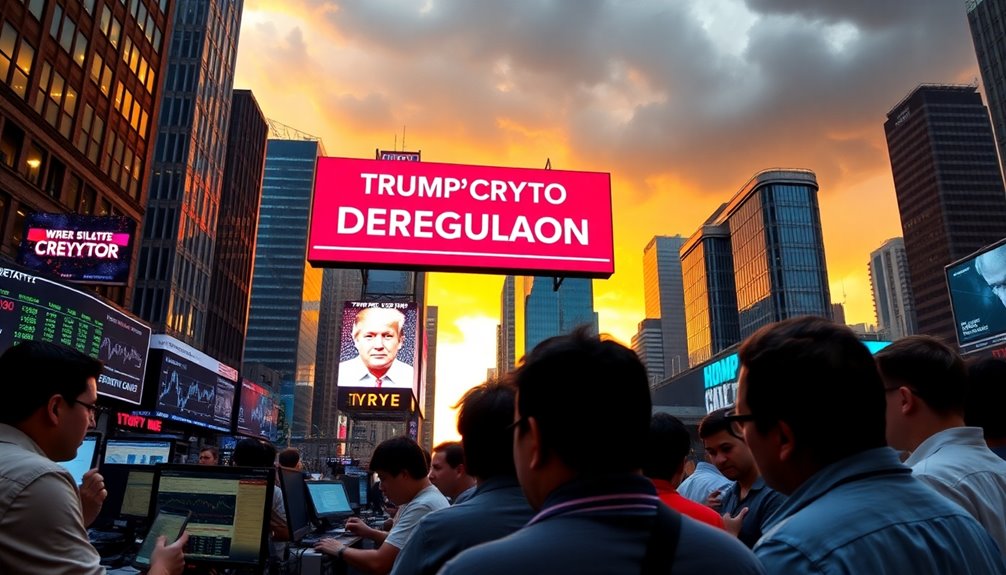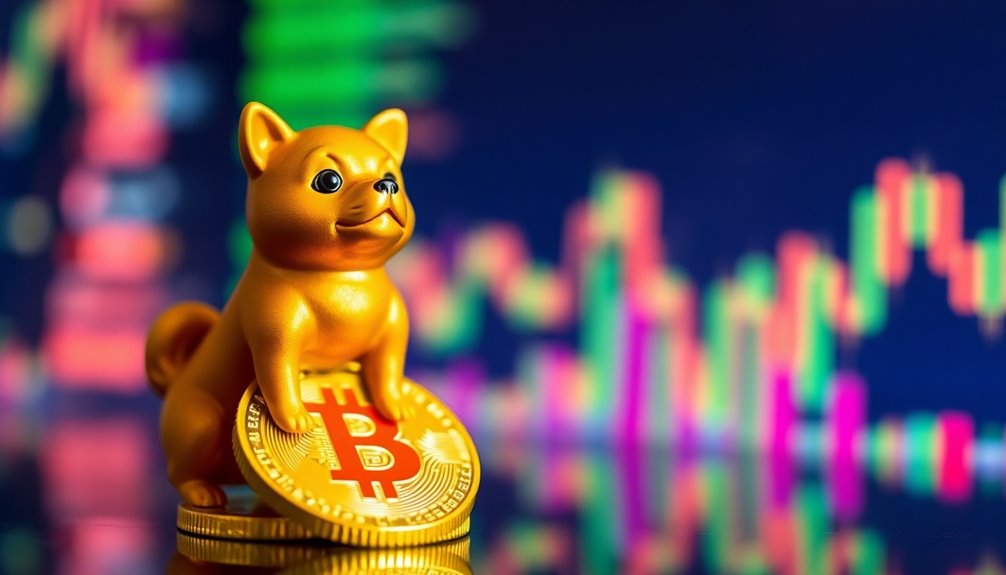Trump's crypto deregulation plans focus on enhancing freedom for crypto firms and solidifying the U.S. as a global digital currency leader. You'll see proposals for a national Bitcoin stockpile and an advisory council to streamline regulations. He aims to limit the SEC and CFTC's authority, making it easier for companies to thrive. While these changes could boost market growth and job creation, they also raise concerns about increased volatility and risks without strict oversight. Understanding the balance of these dynamics is essential, and there's much more to explore about how this could impact the future of crypto.
Key Takeaways
- Trump's plan aims to establish a Bitcoin stockpile and advisory council to streamline crypto regulations and encourage investment.
- Proposed deregulation could position the U.S. as a leading crypto hub, enhancing operational freedom for firms and attracting talent.
- The shift in regulatory oversight from the SEC to the CFTC may influence market stability, potentially increasing volatility or fostering growth.
- Trump's opposition to CBDCs reflects a desire to maintain financial freedom, impacting the future of digital currencies in the U.S.
- A supportive regulatory framework is essential for balancing innovation and consumer protection, addressing risks of fraud and financial crime in crypto.
Crypto Regulation Overview

As the cryptocurrency market continues to evolve, understanding the regulatory landscape becomes essential for anyone involved. Various regulatory authorities play significant roles in shaping this environment.
The SEC oversees securities offerings and ICOs to protect investors, while the CFTC regulates commodities and derivatives trading. The FinCEN enforces anti-money laundering and know-your-customer regulations, ensuring exchanges follow strict guidelines.
Additionally, the Department of Justice investigates criminal misuse of cryptocurrencies, supported by the National Cryptocurrency Enforcement Team. Meanwhile, the Department of the Treasury focuses on managing risks and developing thorough frameworks. Comprehensive regulation of blockchain technology is still lacking, highlighting the need for ongoing legislative efforts.
Globally, different jurisdictions adopt varied approaches, emphasizing consumer protection and fraud prevention in an increasingly complex market. Staying informed about these regulations is critical for success in the crypto space.
Trump's Vision for Crypto

While many are still grappling with the complexities of cryptocurrency regulation, Trump’s vision aims to reshape the landscape greatly. He plans to create a national Bitcoin stockpile, keeping all U. S. government-held Bitcoin, valued at over $5 billion. This could profoundly impact the global market, though its purpose remains uncertain. Additionally, Trump’s proposal for a “Bitcoin and crypto presidential advisory council” seeks to involve industry advocates in drafting clearer regulations. He’s also against Central Bank Digital Currencies, viewing them as a threat to freedom. Notably, Bitcoin surged 8% following Trump’s election victory, reflecting growing optimism in the crypto markets. Finally, Trump aims to make America the “crypto capital of the planet” by promoting crypto adoption, easing regulations, and encouraging investments in blockchain projects, potentially accelerating mainstream integration. Furthermore, Trump’s enthusiasm for cryptocurrency extends to the promotion of innovative projects, including a mysterious endorsement of various meme coins that has intrigued investors. This has led to discussions around how his approach to these digital assets could influence their popularity and market dynamics. With the phrase ‘trump meme coin endorsement explained,’ many are left wondering how this potential backing could further propel the meme coin trend and attract a broader audience to the crypto space.
Mechanisms of Deregulation Explained

Trump's vision for a deregulated crypto landscape hinges on several key mechanisms designed to reshape the industry.
First, he plans to limit the authority of the SEC and CFTC, reducing regulatory barriers for crypto companies. This could lead to enhanced innovation, allowing firms to focus on growth rather than compliance. As a result, this environment may enhance operational freedom for Crypto.com, focusing on growth and increasing demand for CRO tokens within the ecosystem.
Second, merging or eliminating banking regulators like the FDIC may simplify oversight, enabling banks to offer crypto services more easily.
Additionally, reissuing OCC guidance on crypto custody can lower entry barriers for traditional banks, promoting institutional adoption.
Finally, establishing a supportive regulatory framework, including a U.S. bitcoin strategic reserve, signals federal backing for crypto ventures, aiming to position America as the "crypto capital of the planet."
Pros and Cons Analysis

Deregulation in the crypto space presents both opportunities and challenges that can considerably impact the market.
On the positive side, increased flexibility could encourage market growth, attracting capital and talent to the U.S. Furthermore, innovation may thrive without heavy restrictions, benefiting the broader economy. This potential for job creation in blockchain and fintech sectors adds to the optimism around deregulation.
However, these advantages come with risks. Reduced oversight might amplify market volatility, putting inexperienced investors in jeopardy. You could face speculative bubbles, and consumer protection may fall short.
Additionally, the potential for conflicts of interest and ethical concerns could undermine trust in the system. As the balance between growth and risk hangs in the balance, careful consideration of these pros and cons is essential for anyone traversing the evolving crypto landscape.
Deregulation Versus Strict Regulation

As the crypto landscape evolves, the debate between deregulation and strict regulation intensifies.
You'll likely see a push for clearer regulatory frameworks under a pro-crypto Trump administration, which could ease standards for securities and tokenized assets. However, this deregulation raises concerns about consumer protection, particularly for retail investors maneuvering a rapidly changing market. The risk of increased volatility looms large, as reduced oversight can make the crypto market vulnerable to bubbles and crashes. Additionally, the fragmented regulatory environment may create gaps, complicating compliance for businesses. Increasing scrutiny on crypto and digital asset transactions by global regulators will further complicate the landscape for businesses seeking to navigate these changes.
Balancing the need for innovation with the necessity of safeguarding investors will be vital as you consider the implications of these regulatory shifts on the broader financial system.
Market Volatility Concerns

While the allure of cryptocurrency continues to grow, market volatility remains a pressing concern for investors and regulators alike.
Regulatory uncertainty, like China's Bitcoin ban, can trigger sharp price drops, leaving you wary. As the industry pushes for clarity, the shift from SEC to CFTC oversight could either stabilize or heighten volatility, depending on Trump's evolving stance. Recently, $1.6 billion in bullish crypto derivatives positions were liquidated, indicating rapid exits by investors.
Investor sentiment also plays a huge role; retail-driven markets are prone to panic selling. Large transactions by whales or companies like MicroStrategy can swing prices dramatically.
Additionally, economic factors like inflation and high interest rates create an unpredictable environment.
As a new investor, understanding these elements is essential to maneuvering the turbulent crypto landscape effectively.
Recent Market Movements

Recent movements in the cryptocurrency market showcase a mix of optimism and strategic shifts, especially with increased institutional adoption driving growth.
Financial institutions are stepping up their investments, which legitimizes cryptocurrencies and boosts market confidence. You'll notice major players exploring blockchain for cross-border payments, enhancing liquidity in crypto markets. In addition, the anticipated Bitcoin halving event in 2024 is expected to further increase scarcity and drive prices upwards. Furthermore, the rise of Decentralized Autonomous Organizations (DAOs) is creating new avenues for investment and governance in the crypto space.
This adoption not only heightens demand but also integrates cryptocurrencies into traditional finance, increasing their utility. Additionally, countries are forming strategic reserves to hedge against inflation, which could greatly impact Bitcoin's price.
As institutional funds flow in, you're likely to see Bitcoin appreciating, creating unique opportunities for retail investors to diversify their portfolios and tap into this evolving landscape.
Regulatory Compliance Checklist

Charting the complex landscape of cryptocurrency regulations is essential for exchanges and users alike.
Start by ensuring your exchange registers with FinCEN and renews every two years. You'll need to implement robust AML identity verification processes, collecting customer names and addresses while verifying identities with official documents. This process is critical because money laundering obscures the origin of illegally obtained funds.
Don't forget to comply with the Travel Rule, gathering and transferring customer information during transactions.
Be vigilant about reporting suspicious activity. File CTRs for transactions over $10,000 and SARs when suspicious behavior arises.
Utilize automated AML software to streamline these processes.
Finally, monitor transactions closely for signs of financial crime, using automated tools and regular audits to assess vulnerabilities.
Compliance isn't just necessary; it's crucial for maintaining trust in the crypto ecosystem.
Frequently Asked Questions
How Will Trump's Plans Affect Global Crypto Regulations?
Trump's plans could substantially affect global crypto regulations by inspiring other nations to adopt similar policies, fostering a more cohesive framework.
You might see increased investor confidence in the U.S. market, attracting institutional investments and shifting global dynamics.
As the U.S. positions itself as a hub for decentralized finance, regulatory clarity could reduce uncertainty, prompting countries to rethink their approaches to crypto, ultimately influencing international discussions and fostering innovation in the sector.
What Specific Cryptocurrencies Will Benefit From Deregulation?
You'll find that specific cryptocurrencies like Bitcoin, altcoins, and Dogecoin stand to benefit from deregulation.
Bitcoin's market surge and potential federal support could stabilize its value.
Altcoins may gain from clearer regulatory guidelines, encouraging adoption.
Meanwhile, Dogecoin's popularity, bolstered by industry backing, could increase trading volumes.
However, keep in mind the risks associated with market volatility and regulatory uncertainties that might accompany these changes.
Who Are the Main Proponents of Trump's Deregulation Strategy?
You'll find that key proponents of Trump's deregulation strategy include influential figures like Paul Atkins and David Sacks, who support relaxed crypto regulations.
Billionaires like Elon Musk and Vivek Ramaswamy also back these initiatives, pushing for less stringent oversight.
Organizations such as the Republican National Committee and various crypto exchanges advocate for clearer regulations.
Together, these individuals and groups aim to foster a more accommodating environment for the crypto industry.
How Might Deregulation Impact Crypto Investors' Rights?
Deregulation can greatly impact your rights as a crypto investor. Without clear guidelines, you might struggle to understand your protections, increasing your risk of scams and fraudulent activities.
Unregulated markets could expose you to volatile assets, making financial losses more likely. Additionally, shifts in regulatory oversight may create confusion about which body governs your investments.
Ultimately, a lack of robust protections could undermine your confidence and trust in the crypto market.
What Are the Potential Legal Challenges to Trump's Deregulation Plans?
You might face several potential legal challenges with deregulation plans.
First, regulatory ambiguity can create confusion about which agency oversees cryptocurrency.
Second, without adequate consumer protection, unsophisticated investors risk significant losses.
Third, compliance and enforcement could become difficult, leading to potential penalties for businesses.
Finally, political and legislative barriers may hinder effective implementation.
These factors could complicate the landscape for both investors and crypto businesses, making it essential to navigate carefully.
Conclusion
To sum up, Trump's crypto deregulation plans could greatly reshape the market landscape. While his vision aims to foster innovation and boost economic growth, it also raises concerns about market volatility and investor protection. You'll need to weigh the pros and cons carefully, considering how these changes might impact your investments. Staying informed about the evolving regulatory landscape is essential to navigate potential risks and opportunities in the ever-changing world of cryptocurrency.









